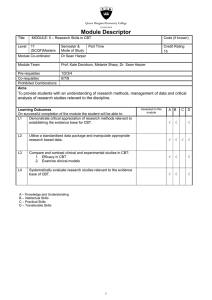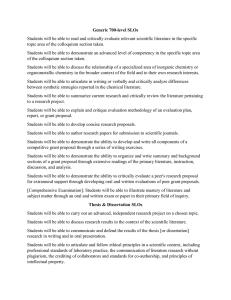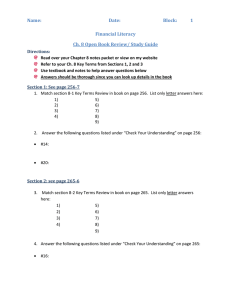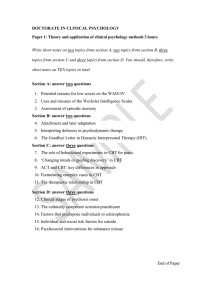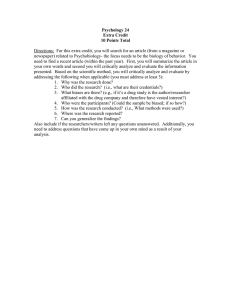MSc. (Modules 9 – 12)
advertisement
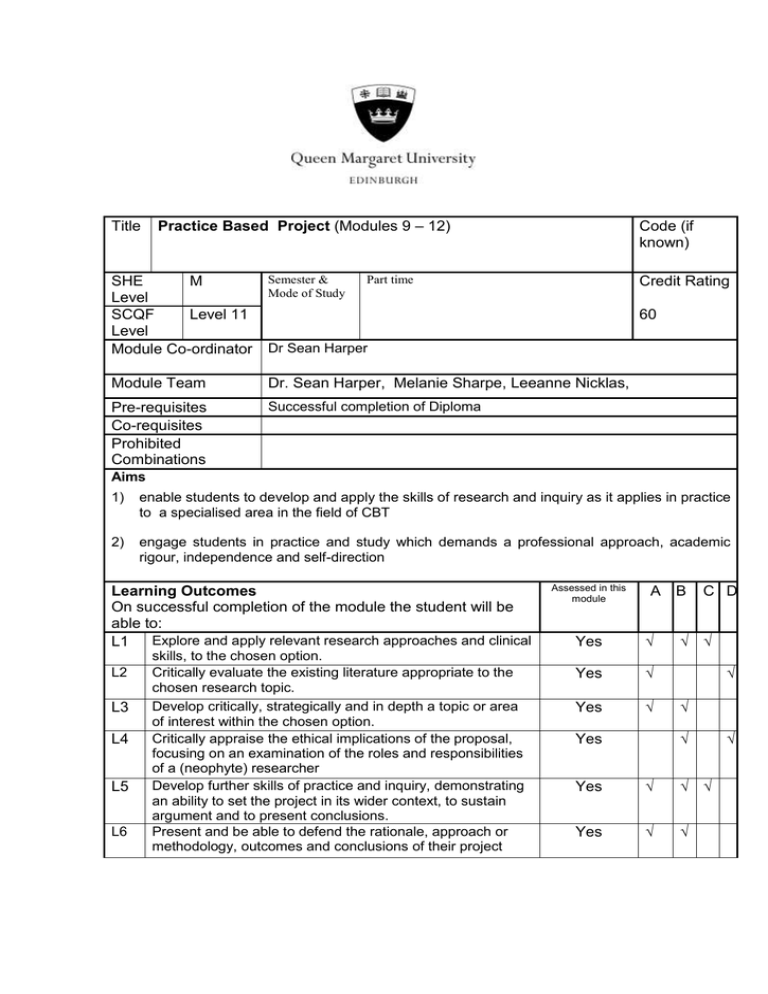
Title Practice Based Project (Modules 9 – 12) Code (if known) SHE M Level SCQF Level 11 Level Module Co-ordinator Semester & Mode of Study Part time Module Team Dr. Sean Harper, Melanie Sharpe, Leeanne Nicklas, Pre-requisites Co-requisites Prohibited Combinations Successful completion of Diploma Credit Rating 60 Dr Sean Harper Aims 1) enable students to develop and apply the skills of research and inquiry as it applies in practice to a specialised area in the field of CBT 2) engage students in practice and study which demands a professional approach, academic rigour, independence and self-direction Learning Outcomes On successful completion of the module the student will be able to: Explore and apply relevant research approaches and clinical L1 L2 L3 L4 L5 L6 skills, to the chosen option. Critically evaluate the existing literature appropriate to the chosen research topic. Develop critically, strategically and in depth a topic or area of interest within the chosen option. Critically appraise the ethical implications of the proposal, focusing on an examination of the roles and responsibilities of a (neophyte) researcher Develop further skills of practice and inquiry, demonstrating an ability to set the project in its wider context, to sustain argument and to present conclusions. Present and be able to defend the rationale, approach or methodology, outcomes and conclusions of their project Assessed in this module A B Yes √ Yes √ Yes √ C D √ √ √ √ √ Yes Yes √ √ √ Yes √ √ √ A – Knowledge and Understanding B – Intellectual Skills C – Practical Skills D – Transferable Skills Learning Experiences The module will engage the student in the following types of learning experiences: Students will select one of the specialised options: Personality Disorders, Bipolar Disorder, Eating Disorders, Psychosis, CBT Supervision, developments in CBT training, practice and dissemination or the student’s specialist interest as approved by course team. 10 hours maximum supervision. 590 hours self directed learning. 6 hours research skills workshops. Assessment Pattern Dissertation of the research project which is an investigation of a topic within the chosen specialist area of CBT (13,000 words). The project will involve an exploratory piece of research which would include designing and undertaking a research project including choosing appropriate research questions, epistemology, methodology, collecting data, analysing data and drawing appropriate conclusions from your study. Due consideration should be given to ethical requirements of the study and appropriate Research and Development procedures should be observed. This could be in the form of a small scale, service related audit, service based evaluation, a single N or case series design. A range of research approaches or project methodology may be adopted, drawing for example from phenomenological, case study, implementation science or action research paradigms and using quantitative, qualitative, or mixed methods of data collection and analysis. The components of the dissertation would include: a. A research proposal; (2000 words.) This would detail the title and rationale of the chosen research project, and then appraise the relevant research methodologies, epistemology and comprehensive consideration of ethical issues. b. A literature review: (6000 words.) This would be a comprehensive literature review focusing on a topic related to a specific aspect of the research proposal which critically appraises and synthesises the evidence pertaining to a specific area explored in the proposal. c. Paper for publication (5000 words) in journal article format. The student should identify an appropriate journal in which they wish to publish and follow appropriate style. The paper would summarise the above literature review and detail the actual project undertaken and present ready to be submitted for publication, with some discussion of a potential route of dissemination such as work based report, publication, poster, etc. Can this Module be Anonymously marked? an explanation. Yes/No If No please provide The dissertation will be marked by internal supervisors so cannot be done so anonymously Content This is dependent on the option undertaken. Supervision will be provided by specialist supervisors. Main Texts These will be defined by the option area and appropriate to area of study. See option specific section of project handbook for details. Barker, C., Pistrang, N. and Elliot, R. (2002). Research Methods in Clinical Psychology: An Introduction for students and Practitioners- 2nd Edition. Chichester: Wiley. Becker L (2004) How to manage your postgraduate course. Palgrave Macmillan Bell J. (2005) (4th ed) Doing Your Research Project: a guide to first time researchers in education and social science. Maidenhead OU Press. Blaxter, L., Hughes, C., & Tight, M. (2010) How to Research-4th Edition. Open University Press. Clarke, M., & Oxman, A.D., (2003) Cochrane Reviewers Handbook. 4.2.0 Oxford: The Cochrane Collaboration; 2003. Coolican, H., (2009) Research Methods and Statistics in Psychology-5th Edition. Routledge. Cuttie D (2005) Developing and applying study skills, writing assignments, dissertations and management reports London Chartered Institute of Personnel and Development Day, A., (2008.) How to get research published in Journals -2nd Edition. Gower. Denscombe, M., (2010). The Good Research Guide for Small Scale Social Research Projects. Buckingham, Open University. Fairbairn G.J. & Fairbairn S (2001) Reading at University: a guide for students Buckinghamshire OU Press Field A, and Hole G, (2003) How to design and report Experiments. Sage, London. Hart C (1998) Doing a literature review. Sage, London Jarvis P Holford J Griffin C (2003) The theory and practice of learning London Kogan Page Jasper M (2003) Beginning reflective practice Cheltenham Nelson Thornes Katrak, P., Bialocerkowski,A.E., Massy-Westropp, N., Kumar, S., & Grimmer, K.A. (2004) A systematic Review of the Content of Critical Appraisal Tools. BMC Medical Research Methodology 2004, 4:22 O’Brien, P.M.S., & Pipkin, F.B. (1999) Introduction to Research Methodology for Specialists and Trainees. RCOG Press. Parker,R.I., & Brossart D.F.(2003) Evaluating Single Case research data: A comparision of seven statistical methods . Behavioural Therapy, 34, 189-211. Parry, G. & Watts, F.N. (1996) Behavioural and Mental Health Research: A Handbook of Skills and Methods-2nd Edition. Lawrence Erlbaum Associates, Ltd. Hove. Petermann, F. & Muller, J.M. (2001) Clinical Psychology and single case evidence: A practical approach to treatment planning and evaluation. Wiley. Sommer, B. & Sommer, R. (2001) A Practical Guide to Behavioural Research: Tools and techniques-5th Edition. Oxford University Press. Wallace M Wray A (2006) Critical reading and writing for Postgraduates London: Sage Other relevant details Programme specific issues will be outlined in the project handbook Signed Module Co-ordinator Dr Sean Harper Date March 2014 Registry use only Date received
